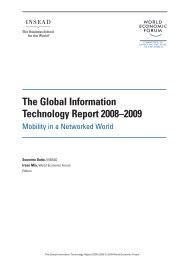Creative Economy: A Feasible Development Option
Creative Economy: A Feasible Development Option
Creative Economy: A Feasible Development Option
- No tags were found...
You also want an ePaper? Increase the reach of your titles
YUMPU automatically turns print PDFs into web optimized ePapers that Google loves.
9.2 UNCTAD: <strong>Creative</strong> industries on the economicand development agendaSince the year 2000, UNCTAD has been promotinginternational policy action to assist developing countrieswith enhancing their creative industries and hence theircreative economy for trade and development gains.9.2.1 UNCTAD X: Audiovisual servicesAt the tenth session of UNCTAD (UNCTAD X),held in Bangkok, Thailand, and attended by representativesof 168 Member States, the UNCTAD secretariat was mandatedto carry out research and analysis with a view to formulatingpolicy recommendations in the area of trade inservices, including audiovisuals. 3 UNCTAD convened anintergovernmental Expert Meeting on Audiovisual Servicesin 2002 in close collaboration with UNESCO. This forumprovided insights to assist developing countries to examine9Box 9.1Television and soap operasThe international dimension of creative-industries policyTV Globo is a Brazilian broadcast television channel whose signals reach 189 million viewers across the continent. It offers a rich range of programmingat no cost to millions of homes across the country, from entertainment to news, helping to spread a variety of points of view as it strives to constantlyinnovate both in format and language. With its continental reach, TV Globo touches all creeds, classes and geographic regions and has emerged as oneof the most valuable tools for preserving the nation’s cultural heritage not merely because of its commanding geographical presence but also as a sourceof inspiration for literature, theatre, film, music and the visual arts. There are no limits to exploring the frontiers of knowledge on television, only thechallenge of making complex ideas easily comprehensible without becoming superficial, and reporting what is essential and true to the widest possibleaudience. This is the daily demand of television, a job that calls for both professionalism and sensitivity.TV Globo’s rise as a major production centre (generating some 2,500 hours of entertainment programming a year) and as a training ground for actors,directors, screenwriters, technicians and producers also creates valuable spin-offs in the audiovisual industry, from independent production companiesto the growing market for Brazilian-made films. The network’s artistic footprint falls far beyond national borders. Exporting programming to over 130 countries,it is no exaggeration to say that Globo has become Brazil’s cultural ambassador to the world. TV Globo employs 18,000 people and has 5 channelsand 117 affiliates. Today, TV Globo reaches audiences across the world. In 2009, it exported 65 programmes to 83 countries worldwide. Not to mentionTV Globo International, the first Brazilian 24-hour channel to be beamed by satellite to Brazilians and Portuguese speakers abroad. Launched in 1999, thischannel now airs in 115 countries and boasts more than 550,000 premium subscribers. More than 300 productions were sold to 130 countries.But Globo also strives to fortify civic responsibility and awareness even as it entertains. Among privately owned networks, we are world pioneers in systematicallyworking themes of social relevance and matters of public interest into our everyday programming grid — without the slightest interferencefrom sponsors or a cent in government funding. In recent years, TV Globo has also brought an innovative social dimension to its sports coverage. Whetherin publicity drives, straightforward reporting or though outright entertainment, TV Globo widens its lens beyond the thrill of competition to capture howsporting events can serve as a springboard for social inclusion. Calling on sports figures from famous athletes to physical education instructors, we striveto demonstrate the importance of education, discipline, dedication, respect, and solidarity as well as the need to overcome adversity.If TV Globo’s programming plays a central role in Brazilian society, our contribution to the media industry and the national economy as a whole is no lessremarkable. Advertisers themselves tell of how TV Globo’s high programming standards raised the bar for their own industry, driving commercials to newlevels of technological sophistication and creativity. No wonder Brazilian television advertising has won applause and prizes the world over. In Brazil, thevast majority of advertisers are small and medium-sized companies and agribusiness, which together provide most of the jobs in the formal economy.All these initiatives and the community response they generate are part of the process of creating what might be called the “public value” of broadcasttelevision, represented here by the Globo Network. Building public value is a goal prized by institutions the world over and one that a private companysuch as TV Globo managed to achieve thanks to the democratic choice of our viewers — a partnership that has kept us in synch with Brazil for 45 years.This record of accomplishment is what gives us the will to keep on working, to the best of our abilities, to advance social development and so to carry outour mission to create, produce and disseminate top-quality products that inform, educate and entertain to better the lives of individuals and their communities.After all, in the very document that lays down our institutional vision and principles, we define the media as an instrument of a social organizationthat turns the quest for the common good into a reality.By Luís Erlanger, Director, Central Globo de Comunicação, TV Globo, Brazil.3 UNCTAD (2002). Audiovisual services: Improving participation of developing countries.232 CREATIVE ECONOMY REPORT 2010
















